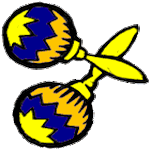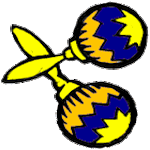¿Cómo se forma?
|
The present subjunctive is
formed in three steps.
|

|
1. First conjugate the verb in the present indicative:
hablar=> hablo
beber=> bebo
escribir=> escribo
hacer=> hago
tener => tengo
empezar=> empiezo
volver=> vuelvo
**
Note that if the yo form is irregular in the present indicative, the
irregularity will remain when it in conjugated in the present
subjunctive.
remember: stem changing verbs (e-ie, e-i, o-ue), 'go'
verbs, etc.
2. Next, you drop the final "o" from the present indicative conjugation, thus leaving only the stem:
hablar=> habl-
beber=> beb-
escribir=> escrib-
hacer=> hag-
tener => teng-
empezar=> empiez-
volver=> vuelv-
3. Finally add your new (opposite) ending:
-AR Verbs: -ER/ -IR Verbs:
e
emos
a amos
es
éis
as áis
e
en
a an
These endings are opposite from the present indicative endings that you
have learned previously, the 'As' become 'Es' and the 'Es' become 'As'.
hablar=> hable
beber=> beba
escribir=> escriba
hacer=> haga
tener => tenga
empezar=> empieze
volver=> vuelva
Irregular verbs in the present subjunctive
As always there are some completely IRREGULAR verbs in the present subjunctive, but only 5 of them.
haber, ir, saber, ser, dar, and estar
---Think about the verbs first in
the present indicative yo form:
hay*, voy, sé, soy, doy, estoy
*haber we only ever see it in the
third person singular
--there is no final
"o" to drop so of course they are going to be irregular.
haber = haya, hayas, haya, hayamos, hayáis, hayan
ir= vaya, vayas, vaya, vayamos, vayáis, vayan
saber= sepa, sepas, sepa, sepamos, sepáis, sepan
ser= sea, seas, sea, seamos, seais, sean
dar= dé, des, dé, demos, deis, den
estar= esté, estés, esté, estemos, estéis, estén

|
To remember these irregulars you can chant them:
haya, vaya, sepa, sea, dé, esté, cha, cha, cha. |

|
<-Back to Project 2



